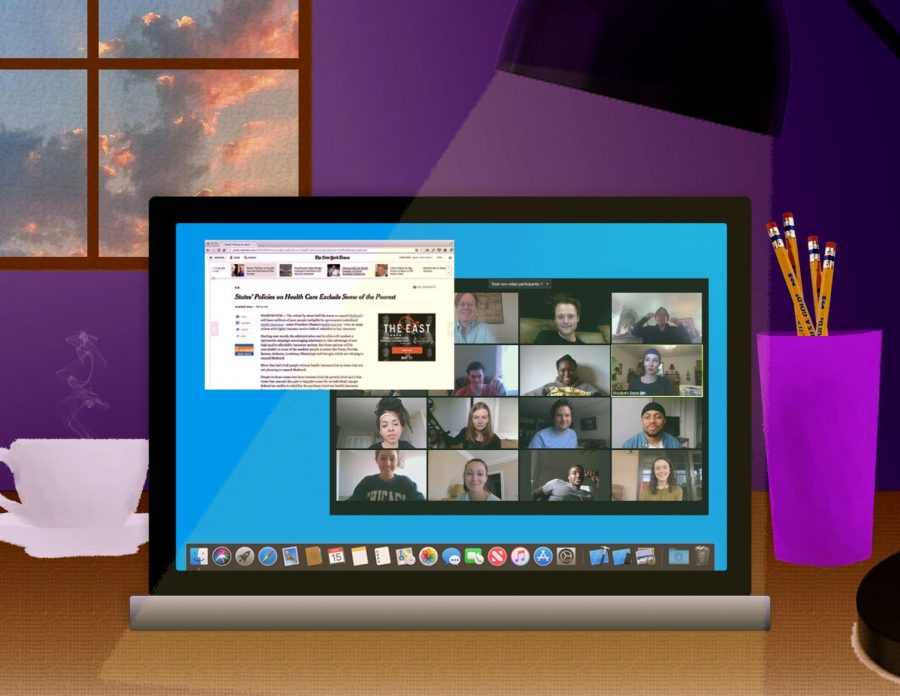Online classes bring struggles for some students and professors
Online learning has left some Dallas College instructors and students facing problems with online-only classes.
November 12, 2020
Online learning has left some Dallas College instructors and students feeling distressed this fall semester.
Experienced professors, such as Deborah Hanus, who has taught math at Brookhaven for over 20 years, knows math is not an easy concept to learn over the internet, especially when it is self-taught.
Hanus said the assurance of student comprehension for teachers is important, but without face-to-face communication it is difficult to ensure.
Hanus said she worries students are not asking for help like they did in previous semesters. She said she speculates students are using other resources to help them learn the material, whether it be a close contact person or technology resource.
Without the proper instruction, Hanus said, she is concerned for students who are continuing math-based courses. “Students that just need one math course to complete their degree, I’m not overly concerned about,” Hanus said. “But the students who want to take courses after this that require them to know this material, it is extremely concerning.”
TRIPLE THE WORK
Aside from worrying about students on a weekly basis, Hanus said she has a problem of her own. She is using several platforms for her classes, and the procedure of updating content regularly is stressful, she said.
Intermediate students depended on keen content and pre-recorded lectures, especially those that struggle.
She works diligently, making sure content and every lecture is coherent so students can understand smoothly, she said. As a result, Hanus said the online format has increased her workload three or four times.
COMMUNICATION CHALLENGES
Insecurity may play a role in students’ inability to ask questions, despite continuous emails sent by professors who encourage students to seek help or question, Hanus said.
In an email to The Courier, Jordan Watkins, Early College High School physics teacher, said he prefers in-person learning but does not mind the new format. He said he does not receive feedback from half of his students when he sends an email to ensure they are keeping up with class.
Watkins said he relies on an email response because it substitutes for facial expressions he would normally receive in a classroom. Watkins said he hopes that by reaching out to his students he will be able help them out, even if it is just one person. Watkins said, it is an educator’s purpose to lend a hand and assist students when needed.
When Watkins can help a student, he said, he can be flexible regarding due dates. Watkins said a student’s knowledge is more important than moving on with the course. “I can be lenient on the due date,” Watkins said. “I would much rather know what a student can do than what they can’t do.”
Watkins said he prefers in-person labs over online labs but cannot currently hold them due to restrictions by the college on how they can be at the campuses.
He wants to enable students to work more with hands-on lab experiments from home. Watkins’ students conduct experiments from home by evaluating simulations, finding measurements, calculations and comparing the simulations, he said. Students then write a lab report related to the experiment and expressing their findings, allowing them to experience professional communication through science.
Watkins said teachers should not favor on-campus instruction just because it is simpler than online. “We shouldn’t be comfortable or complacent in our methods and ignore the true purpose, which is to create the best educational experience for the students,” Watkins said.
PREPARATIONS AND PROSPECTS
Not every professor is experiencing the same issues. In an email to The Courier, Brookhaven English professor Brianne Sardoni said she is enjoying the remote learning format.
Sardoni said she took training with the Association of College and University Educators over the summer where she learned tips to improve student learning over the internet. And as a result she said she has received positive feedback from students regarding the course. She said students are comfortable with micro lectures, an alternative to regular lectures. Micro lectures were recommended during the ACUE training.
Sardoni’s new format required a substantial amount of preparation, she said. “I spent over 100 hours over the summer prepping my course shells, recording videos, ensuring files were ADA compliant and making sure the structure of the course would make sense for my students,” Sardoni said.
Sardoni also teaches English to ECHS students and said that she is not experiencing any difficulties with them.
Sardoni said she is looking forward to continuing online courses once the pandemic is settled and in-person classes resume. With the training, effort and time it took her to assemble contents, she said she wants to continue using them for future courses.
Hanus said she prefers in-person classes and hopes to return to campus. Assuring students comprehend material is her top priority, she said. With direct communication, Hanus would be able to teach students complex problems, so they would not struggle later.



